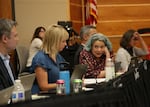The Bend City Council’s first in-person meeting since the onset of the COVID-19 pandemic was far from quiet.
Advocates for unhoused people and residents clashed on Wednesday when councilors considered a new ordinance allowing for fewer restrictions on building shelters across the city. The ordinance would amend the city’s development code to allow for three different types of permanent shelter — group, multi-room and outdoor.
The proposed changes stem from the passage of House Bill 2006 in 2021, which reduced zoning requirements for homeless shelters in cities across Oregon. Crafted to bolster the number of shelters, the state law expires in July 2023.
Bend officials are attempting to set rules with more staying power. They are also reacting to Martin v. Boise, a 2018 decision by the 9th U.S. Circuit Court of Appeals that ruled cities could not ban public camping if people without shelter had nowhere else to go. The case resulted from Boise police officers citing unhoused people for camping while local shelters were full. It ended in a $1.3 million settlement.
Many Oregon cities face a similar conundrum — how to square public pressure to clear camps, while also finding places to shelter unhoused people, who are growing in number. In some cities, sentiment in favor of clearing camps appears to be gaining the upper hand.

When word spread that Bend police would clear campers from Emerson Avenue in June, more tents appeared on along Colorado Avenue and US Hwy 97. Fearing another removal, campers and volunteers worked to clear weeds and debris on July 27, 2021.
Emily Cureton Cook / OPB
Portland Mayor Ted Wheeler has recently started cracking down on homeless camps, especially those on the sides of roads and freeways.
Eugene temporarily allowed unhoused people to camp in public parks, but city leadership revoked that rule in March. The city now has a ban on all unsanctioned camping on public property.
Last summer Bend rolled out a policy allowing officials to remove camps and evict people living along public streets and sidewalks if the City Manager deems an area unsafe. In March, Bend police officers cleared a camp on 2nd Street after City Manager Eric King declared it a hazard to public health.
Bend Chief Operating Officer Russell Grayson said there are no planned shelters attached to the proposed shelter ordinance, but that it will allow private owners to apply to build shelters under certain parameters in the future.
Councilor Megan Perkins said a separate ordinance limiting where, when and how people can camp in Bend will come before the council sometime this summer, and a draft was not yet available.
Councilors ultimately decided to table a first reading of the shelter code changes and instructed city staff to bring a new draft for the May 18 council meeting.
At least 30 people spoke at Wednesday’s public hearing, most of whom opposed the draft code because of safety concerns. Many shared talking points similar to Bend Humanity Coalition, an organization founded by former Bend city councilor Jeff Eager. The group has pushed current city officials to remove all unsanctioned camps and use criminal enforcement to punish people who litter or use the bathroom outside.
The hearing atmosphere was extremely tense at times, with multiple members of the audience shouting over Mayor Sally Russell and other officials, and continuing to applaud and cheer despite being asked to stop.
Scott Winters, who chairs Bend’s planning commission, told councilors the largest misconception he sees from residents is the belief that unhoused people are not part of the community.
“Let’s be clear — we are experiencing houselessness,” Winters said. “Our community is experiencing houselessness.”
The debate over city code comes as the number of unhoused people in Central Oregon has skyrocketed, and housing costs continue to increase. There were 1,099 homeless adults and children in the area on a single night in January 2021 according to the annual point-in-time count.
Some advocates have argued that point-in-time counts undercount the actual number of people who are unhoused.

Bend city officials discuss proposed code changes to encourage more homeless shelters at a May 5, 2022 meeting.
Joni Land / OPB



